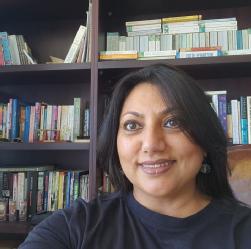Warwick Law School News
Warwick Law School News
The latest updates from our department
Warwick Law School welcomes new Visiting Fellow
Warwick Law School welcomes IAS Visiting Fellow Prof Waheeda Amien from the University of Cape Town to our community.
She will be working with us until 6 November this year.
Whilst at Warwick, Professor Amien will be collaborating with Dr Rajnaara Akhtar on mutual research interests, and a potential funding application. Her bio can be found below.
She told us, “I’m very happy to be at WLS. It’s a beautiful campus. Everyone has been very friendly and helpful so far. This reinforces the sense of community that colleagues back home who previously visited WLS promised I should expect here”.
It is great to have you with us Waheeda. Welcome to Warwick.
Bio: Waheeda Amien (BA LLB (Cape Town) LLM (Western Cape) PhD (Ghent)) is a Professor of Legal Pluralism, Religious Family Laws, and Human Rights in the Faculty of Law at the University of Cape Town. She is primarily involved in research on legal pluralism, mainly as it relates to minority religious family laws. Waheeda is also a Member of the South African Law Reform Commission’s Advisory Committee on the Review of Aspects of Matrimonial Property Law. And she is a Member of the Executive Body of the International Commission on Legal Pluralism, a Member of the Steering Committee of the International Network of Scholars Researching Unofficial Marriages, and on the Advisory Board of the Dullah Omar Institute at the University of the Western Cape.
Waheeda serves on several editorial boards of leading international journals including the Journal of Legal Pluralism and Critical Social Analysis. She also recently served as an Acting Judge of the North Gauteng Division of the High Court in South Africa.
Her work on the recognition and regulation of Muslim marriages in South Africa was used extensively in the seminal case of Women’s Legal Centre Trust v President of the Republic of South Africa 2022 (5) SA 323 (CC). One of the primary claims of the Women’s Legal Centre Trust was based on Waheeda’s argument that Muslim marriages should not only be recognised but also regulated by the South African state. Consequently, the South African apex court, the Constitutional Court, ordered among others, the enactment of new legislation or the amendment of existing legislation to recognise and regulate the consequences of Muslim marriages in South Africa.
Waheeda teaches and supervises masters’ and doctoral students and publishes prolifically in her areas of specialisations. She has provided expert opinions to a range of local and international entities including among others, the United Nations Expert on Minority Issues, the South African Presidency, and the South African Commission on Gender Equality.
